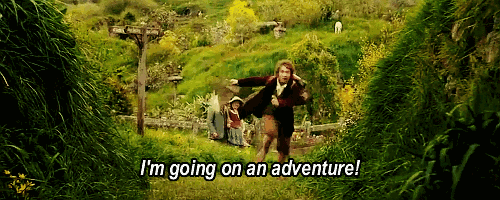I was
blown away, as so many fans and non-fans alike were, by The Hobbit. A trilogy
directed by the wondrous Peter Jackson and derived from the incredible fantasy
novel by J. R. R. Tolkien. I’m also a little – okay, a lot – obsessed with Game
of Thrones, HBO’s fantasy series created by D. B. Weiss and David Benioff and
based on the bestselling author George R.R. Martin’s books. The first is
without a doubt now commonly referred to as a classic. The second is currently
engaged in a debate within the literary world as to whether or not it should be
accepted into the clique, with some critics believing its worldwide recognition
is solely due to its adaption. Did the HBO series come too early for George
R.R. Martin? After all, if there were no adaption, would Game of Thrones not
fit the criteria?
Whilst to
discuss what a ‘classic’ actually is, is a separate and intrinsic debate in
itself, it is important that I quickly note that Game of Thrones does have some
qualities that resonate with the criteria, that many have said makes a classic.
According to Richard J. Smith’s studies of the I Ching, (an ancient Chinese
literature manual) classics address fundamental issues of the human condition
in “‘beautiful, moving, and memorable ways,’ with ‘stimulating and inviting
images.’ Third, it must be complex, nuanced, comprehensive, and profound,
requiring careful and repeated study in order to yield its deepest secrets and
greatest wisdom.” – sound familiar? Well, I suppose that depends on your
opinion of Game of Thrones.
So back
to the point, let’s look at what seems to be the cycle thus far. A great book
is written. At the time of publication it is either quietly popular or limited
to a niche market. After all, the Hobbit was “once upon a time, largely ignored
by the literary world, dismissed as beneath notice” (Mandala 2010: 2). Then,
boom the technology era; a Hollywood blockbuster catapults the book into a
ginormous franchise. It explodes into a cult classic. Its following expands and
reaches parts of the world that it never has before.
For the
Hobbit, such an event has not affected its reputation as a ‘classic’ because it
had already gained said acknowledgement before being turned into a movie
trilogy. Unfortunately for the current book world, this is happening faster
than ever and long before a book has earned its prestige. In a fast-paced
world no one has the patience to wait around and see if a book can withstand
the test of time and earn a place in the exclusive group of classic novels.
Which
leads me to ask, if all great books are getting turned into movies (pretty damn
fast might I add), does that mean that books just exquisitely detailed plans
for Hollywood blockbusters? In the future, will people simply “wait for the
movie to come out”? Are writer’s works only successful these days if they’re
optioned by a production company? Or will books be left alone to mature like a
fine wine and become a cult classic of their own accord?
Looking
at the entertainment industry we can see that on one side we have film,
television and online streaming and on the other side we have books, columns
and blogs (not including the third, awkward cousin that is encompassed in
theatre, musicals, plays, speeches…). The two are no longer mutually exclusive
and the lines are beginning to blur, forcing writers to encompass all things,
novels, blogs, screenplays etc. Perhaps this isn’t a bad thing, after all, the
movies can be exceptional but they can also be a dramatic butchering of the
books – Stormbreaker anyone? Would it not make a nice change, a welcome break,
to see a book stand alone?
Or perhaps
adaptations are not to the detriment of novels. Yes, people will watch the
movie instead. Yes, the gap between publication and premiere release date is
becoming smaller but that doesn’t mean that fans of the novel (both before and
after seeing the Film/TV series/Netflix original) will not continue to read the
book, long after the adaptation has run its course. If despite a motion picture
(either good or bad) the book is still being read years after the death of the
author, then we can continue to create classics because they have withstood the
test of time! As the entertainment industry is changing, the most we can hope
for is that the teachers of the 22nd Century will encourage students
to read the book before they jump
into their 4D virtual simulations or whatever other crazy advancement they might
have then.
For
George. R. R. Martin his future readership (a dedicated bunch) may save him yet
and till then, there’s nothing wrong with indulging in a bloody good binge
session of Game of Thrones because really, who can't resist this..

Bibliography
Mandala,
Susan. 2010. Language in Science Fiction and Fantasy. New York; London:
Continuum.

No comments:
Post a Comment